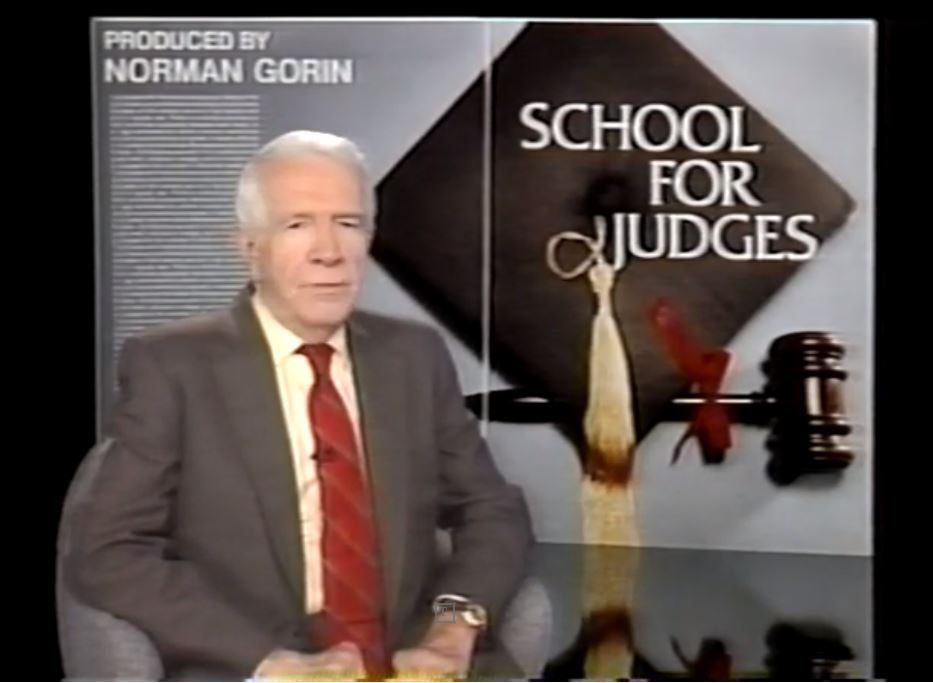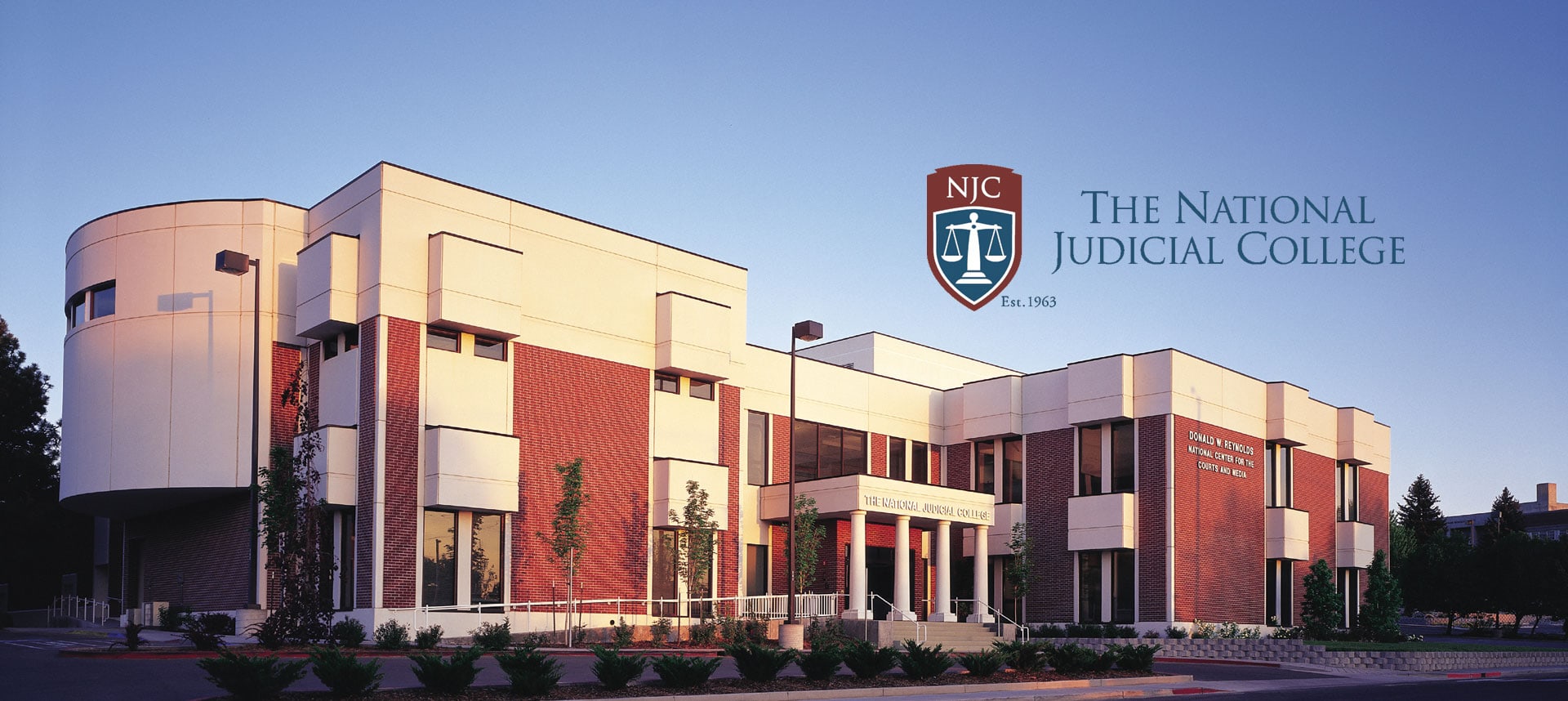
John Burdette Pratt remembers being wary.
It was spring 1990 and he had just been appointed to fill a newly created judgeship in his hometown of Vale, Oregon. It’s a small town in the extreme eastern part of the state, about 12 miles from the border with Idaho.
He was in his law office that day finishing up some work in advance of his move to the bench when the phone rang.
The caller said he was with the CBS news magazine 60 Minutes. The show was preparing to do a story on how lawyers learn to be judges. They said they wanted to follow him to The National Judicial College, where he would be taking General Jurisdiction.
“I was pretty cautious,” he recalls more than 30 years later. “I thought it might be a scam or something.”
It wasn’t. 60 Minutes produced an entire segment on the College and how it prepares new and recently appointed judges for the bench. You can view the piece on the NJC’s YouTube channel at https://www.youtube.com/@thenationaljudicialcollege3888.
It starts with host Harry Reasoner introducing Pratt, who was 39 at the time. In 2013 he retired from full-time service on the bench, but he continues to serve part time as a senior judge.
In his opening monologue, Reasoner asks viewers to imagine that you are a lawyer in a small or medium-size American city and you’re good enough to have just been appointed to the bench.
“Now you’re a judge, with a whole new set of things to learn. You wake up one morning – as John Burdette Pratt did – and from here on you’ll be looking down from the bench on the very people you were one of the day before.”
(Cut to Pratt in a suit and tie, left hand on a Bible, right in the air, being sworn in as a judge.)
Now what do you do?
“If you’re like Judge Pratt, you go to Reno. Yes, Reno. That’s where you can go to school and get a crash course in how to be a judge. Less than a mile from the bright lights of the casinos sits The National Judicial College.”
Judge Pratt says it was a big deal in his small town when Reasoner and the film crew showed up for the swearing-in.
“Everybody had their best clothes on.” The chief justice of the Oregon Supreme Court was present.
During a lull in the filming, he had a chance to sit next to the famous TV journalist.
“He was a really interesting man to talk to. It was very humorous. It was the first day of July and he’d flown into Boise (about 75 miles from Vale). He said, ‘This is really interesting country you have here. It looks like Iowa but feels like Death Valley.’ It was about 110 that day.”
He says the swearing-in was shot as it happened, one take. The crew was not intrusive at all.
After Judge Pratt arrived at the NJC, the focus shifted more to the other judges and the faculty. In the finished piece, it looks like Reasoner is conducting the interviews, but they were actually all done by the producer, Norman Gorin. Footage of Reasoner pretending to interview was spliced in later.
Judge Pratt says he thinks the producers picked him because they wanted to follow a brand-new judge. Many of the others taking the course already had some experience on the bench.
“I happened to be one of the newly minted, so I guess they picked my name out of a hat.”
He says a lot of the judges in class didn’t know 60 Minutes was coming. Some were uncomfortable for a day or two, but then they relaxed. Some even made friends with the 60 Minutes staff, he says.
The TV crew stayed for only the first week and a half (back then GenJur was a four-week course). They returned near the end to film the graduation ceremony and conduct a few more interviews.
The piece was supposed to air a few weeks later, but it ended up being postponed because the Gulf War started in August and much of the news media turned their attention to Iraq and Kuwait. The segment didn’t air until March 31, 1991.
Over the next 20 years he would complete four more NJC courses, “all excellent experiences,” he says.
“Being a new judge and having that opportunity of four weeks at the judicial college was a real blessing and a benefit for me,” he says. “I not only got a lot of instruction but an opportunity to collaborate with the other judges, some of whom had quite a bit of experience and could share their insights and experience.”
Of his starring role on 60 Minutes, he says he didn’t receive as much of a reaction in Vale as he did from the other judges around Oregon. “For a while I was introduced as ‘the 60 Minutes judge.’”
He says he retired at 62 because there were things he and his wife wanted to do while they were still young enough, including traveling and doing three summers of missionary work. They’re both members of the Church of Jesus Christ of Latter-day Saints.
Much of the work he continues to perform as a senior judge involves post-conviction relief. For many years Oregon had a law that allowed for non-unanimous jury verdicts; a defendant could be convicted of a felony with only 10 juror votes, he says.
In 2020 the Supreme Court of the United States ruled such verdicts unconstitutional. Oregon’s Supreme Court later announced that anyone convicted under the former rules was entitled to post-conviction relief. Judge Pratt has been handling some of those cases.
Other longtime judges may be able to relate an experience he had just before retiring from full-time service. In his first year on the bench he presided over a murder trial that lasted three weeks and included some gruesome exhibits, he recalls. The jury found the defendant guilty.
Twenty-two years later, just before Judge Pratt retired, the same man showed up in his courtroom again, as a defendant in a minor matter. The judge had imposed a life sentence and didn’t know he had been released. But there were no Hollywood-style threats of revenge, he says. “He was pretty reasonable.”
Over the years, Judge Pratt has taught in the Oregon’s own program for new judges. He served on Judicial Education Committee for the state and most recently taught a class at a circuit judges meeting on everything judges need to know about post-conviction relief.
It’s his way of paying back the blessings and benefits he first received, in front of TV cameras, at the NJC.

The Hon. Mary-Margaret Anderson (Ret.), a retired administrative law judge with the California Office of Ad...

Happy October, Gaveliers faithful. Are you loving this or what? No one believed a team made up of judges...


Hon. Diane J. Humetewa, the first Native American woman and the first enrolled tribal member to serve as a ...

Retired Massachusetts Chief Justice Margaret H. Marshall has been selected as the 2024 winner of the presti...